Tags
 If you are a writer, you have probably been pelted by dozens of “rules of good writing” from various sources. And you’ve also most assuredly heard them spouted word-for-word from sources of every stripe. At one end of the spectrum: revered oracles and best-selling authors; the other end populated by bloviating rule quoters and clueless hacks.
If you are a writer, you have probably been pelted by dozens of “rules of good writing” from various sources. And you’ve also most assuredly heard them spouted word-for-word from sources of every stripe. At one end of the spectrum: revered oracles and best-selling authors; the other end populated by bloviating rule quoters and clueless hacks.
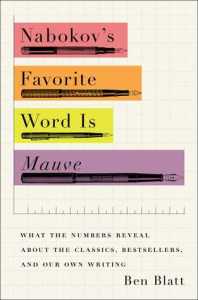 Recently, I read an amusing book, “Nabokov’s Favorite Word is Mauve” by Ben Blatt.
Recently, I read an amusing book, “Nabokov’s Favorite Word is Mauve” by Ben Blatt.
Being a bit of a mathematician, I was intrigued by this statistical analysis of writing styles. What tickled my funny bone, however, was the light shed on how much authors actually obey these supposedly “set in stone” rules.
1) Exclamation points
The oft paraphrased rule by Elmore Leonard is “no more than 3 per 100,000 words of prose”. Yet take a look at how often the man himself used them.
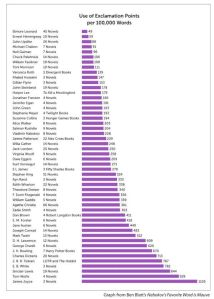 Tsk tsk. The oracle uses forty-nine? He broke his own code!
Tsk tsk. The oracle uses forty-nine? He broke his own code!
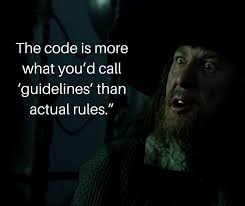
I am relieved to report that my own writing averages about 350 on the above graph, putting me solidly in the middle. In the universe of current authors, that makes me worse that Stephen King, but better than Dan Brown.
Getting back to Mr. Leonard, he at least does deserve credit for being the best of the lot. And keep in mind, his achievement of forty-nine is an average over his entire body of work. But how did the gent perform over his entire career?
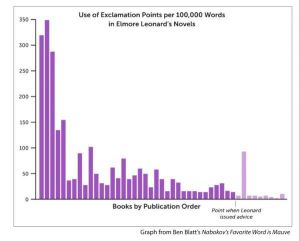 This is one instance where the oracle seems to obey his own rule, but only after he sticks his big foot in his mouth.
This is one instance where the oracle seems to obey his own rule, but only after he sticks his big foot in his mouth.
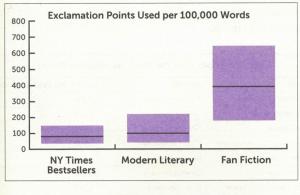 The rule, as a rule, is still something to which we should pay heed. After all, the above graph shows that quality writing leans toward this advice. Looks like I have some improvements to make, before achieving “Modern Literary” quality.
The rule, as a rule, is still something to which we should pay heed. After all, the above graph shows that quality writing leans toward this advice. Looks like I have some improvements to make, before achieving “Modern Literary” quality.
Aw, nuts! (Oops — another pesky exclamation.)
I think the best advice on exclamation points I’ve heard to date was from a professor at DeSales University: “The sentence must earn it.”
2) Abverbs
Mark Twain’s quote — “If you see an adverb, kill it!” — often echoes in my head (Naughty, naughty, Mr Clemens — you used an exclamation point.) Similarly, Stephen King instructs the writer to avoid “-ly” adverbs, recommending that a weak verb paired with an adverb is better replaced with a strong verb: e.g. replace “ran quickly” with “raced.” Personally, I agree with this advice.
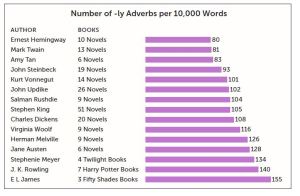 Kudos to Mr. Twain for adhering to his own dictum. King, however needs some remedial work. Though not presented here, Blatt’s book reveals that, like Leonard playing fast and loose with exclamation points, King only obeys his own adverbial advice after the year he penned it in his seminal work, “On Writing.”
Kudos to Mr. Twain for adhering to his own dictum. King, however needs some remedial work. Though not presented here, Blatt’s book reveals that, like Leonard playing fast and loose with exclamation points, King only obeys his own adverbial advice after the year he penned it in his seminal work, “On Writing.”
3) Opening with Weather
Everyone is familiar with the oft-ridiculed opening, “It was a dark and stormy night,” penned by Bulwer-Lytton. It is generally accepted that good writers follow another one of Leonard’s rules: “Never open a book with weather.” Well, take a look at how often successful authors ignore that advice.
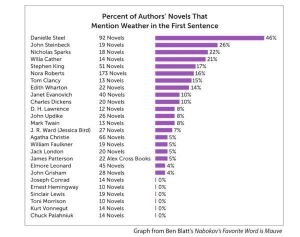 I’m not sure if that’s a condemnation of the quality of certain authors or their
I’m not sure if that’s a condemnation of the quality of certain authors or their
readers.
4) Suddenly!
Again, paraphrasing Mr. Leonard, the rule is “Never use ‘suddenly’.”
I guess as a whole, we writers cannot avoid a steady diet of suddenly’s.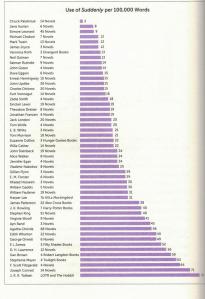
I am pleased to report that I don’t break these rules — at least, not enough to warrant being at the wrong end of these graphs! Don’t believe me? Read my books, and decide for yourself.
If you read them, review them.
If you review them, please alert me if I’ve gotten lazy and broken these rules!


There should be a book called “Least Favorite Words”, by an editor we know who hates the word ‘angst’. I never use exclamation points. I’m still working on the ‘ly’ words. Lesson learned; Bestselling authors can do whatever the hell they want to.
LikeLike